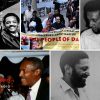This Generation’s Black Power Conference
In the First Call for State of the Black World Conference IV we advanced the theme: It’s Nation Time Again…..Racial Healing and Collaboration for Black Empowerment,focused on the “State of Emergency” afflicting America’s “dark ghettos, and cited the growing movements of resistance and struggle for social justice and transformative change as the framework for a potentially historic gathering of people of African descent. In this Second Call the Institute of the Black World 21st Century (IBW) asserts that with the commitment and concerted mobilizing/organizing of concerned and conscious Black people, State of the Black World Conference IV (SOBWC IV), November 16-20 in Newark, New Jersey could well be this generations Black Power Conference!
Throughout the history of Africans on these hostile shores, in times of crises, challenge and opportunity, our people have convened to assess the nature of our condition, discuss avenues to achieve liberation and devise plans of action and strategies to move forward. Whether it was the Colored People’s Conventions of the 19th Century, the Pan African Congresses that spanned several decades, Garvey’s Conventions of the Negro People of the World or the Negro Congresses in the 1930s, there is a rich tradition of people of African descent, Black people, convening to chart paths towards liberation/full freedom and self-determination.
And, so it was in the era of the 60’s when Black Power burst upon the scene and righteous rebellions rocked this nation. As referenced in the First Call, with the ashes from the rebellion still smoldering, thousands of Black people converged on Newark for the First Black Power Conference. It was an amazing gathering of Nationalists, Pan-Africanists, scholars, grassroots activists, organizers and ordinary Black folks eager to engage the struggle to forge a better future! The Newark Conference was followed by the Second Black Power Conference in Philadelphia in 1968. These electrifying gatherings were not without tensions, controversy and conflicts, sometimes between various ideological tendencies and frequently across generations as emerging leaders challenged some of the heads of “established” civil rights organizations. These issues notwithstanding, the Black Power Conferences helped to solidify a new found sense of “Black consciousness,” nationalism, Pan Africanism and internationalism among the masses of Black people. They also served to give voice to and popularize powerful Black movements determined to confront white supremacy/structural institutional racism in capitalist America andthe Pan African world.
And then there were the Congress of African People (CAP) convened by Amiri Baraka and the Committee for a United Newark in Atlanta in 1970 and the National Black Political Convention in Gary, Indiana in 1972 convened by Mayor Richard G. Hatcher, Congressman Charles C. Diggs of Detroit and Amiri Baraka. CAP ’70, as it was called, set the stage for the Gary Convention by consciously focusing on bringing together the broad diversity of the Civil Rights/Human Rights, Black Power, Nationalist and Pan African leadership and constituencies. Everyone from Whitney Young, the moderate, establishment-oriented President of the National Urban League to Minister Louis Farrakhan of the Nation of Islam attended/participated in this milestone gathering; a convening which stressed the need for united fronts within Black America, based on the principle of “unity without uniformity.”The outcome of CAP ‘70 was a tenuous but necessary rapprochement between the Black power generation and the established Civil Rights organizations and leaders.
The National Black Political Convention in Gary was undoubtedly one of the most significant gatherings of people of African descent in our history in this country. Some 10,000 delegates and observers flocked to this small steel town to assess the condition of Black people in America and the world and to adopt a Black Political Agenda as a blueprint for reform and transformative change. The Preamble to the Agenda was/is a profound statement of the condition of Africans in America and world and a prescription for action. The following excerpts are illustrative:
Our cities are crime-haunted dying grounds. Huge sectors of our youth – and countless others – face permanent unemployment. Those of us who work find our paychecks able to purchase less and less. Neither the courts nor the prisons contribute to anything resembling justice or reformation. The schools are unable – or unwilling – to educate our children for the real world of our struggles. Meanwhile, the officially approved epidemic of drugs threatens to wipe out the minds and strength of our best young warriors.
Economic, cultural, and spiritual depression stalk Black America, and the price for survival often appears to be more than we are able to pay. On every side, in every area of our lives, the American institutions in which we have placed our trust are unable to cope with the crises they have created by their single-minded dedication to profits for some and white supremacy above all.
The crises we face as Black people are the crises of the entire society. They go deep, to the very bones and marrow, to the essential nature of America’s economic, political and cultural systems. They are the natural end-product of a society built on the twin foundations of white racism and white capitalism.
The American system does not work for the masses of Black people, and it cannot be made to work without radical fundamental change. (Indeed, this system does not really work in favor of the humanity of anyone in America).
The challenge is thrown to us here in Gary. It is the challenge to consolidate and organize our own Black role as the vanguard in the struggle for a new society.
More powerful and insightful words have ever been spoken and the fact that they resonate more than four decades after they were written clearly suggests that while much has changed, far too much remains the same in terms of the condition of Africans in America and the world. And, while it may not be possible to replicate the Black Power Conferences which set the stage for CAP ’70 and the Gary Convention, we in IBW believe it’s time for another great gathering of Black people.
The urgency of the State of Emergency afflicting Black people, from the continuing epidemic of police killings, the war on drugs, racially biased criminal justice policies, mass incarceration, voter disenfranchisement, joblessness, economic underdevelopment, gentrification, environmental racism, lead and water poisoning to the internal violence, fratricide, murders in Black communities across this nation suggest that State of the Black World Conference IV can and should be this generation’s Black Power Conference, a cross-generational gathering of veteran leaders,organizers and activists, connecting with an amazing new generation of conscious and visionary leaders who are courageously proclaiming to America and the world that Black Lives Matter!
What if hundreds of Hip Hop activists and cultural workers assemble in Newark to rededicate themselves to translate the articulation of the “realness” of the wretched condition of oppression and exploitation in America’s “dark ghettos” and the Pan African world into revolution – radical, transformative change to realize full freedom, justice and self-determination for people of African descent everywhere!
As a bold act of Kujichagulia, self-determination, what if representatives of the array of organizations and institutions in the Pan African world resolve to adopt the Red, Black and Green Flag that the Honorable Marcus Mosiah Garvey bequeathed to African people as a unifying symbol, as our Flag and proclaim August 17, Garvey’s birthday, Universal African Flag Day?
What if there was an expressed commitment to redouble educating, mobilizing/organizing to end the neo-colonial exploitation and oppression of Africa, the motherland, and a clarion call to African leaders to utilize African-centered concepts of democratic governance to promote the engagement/participation of the people in shaping their destiny — and the institutionalization of the principle of Ujamaa, Cooperative Economics, to ensure that the vast resources of the richest continent on the face of the earth benefit the masses of people in the Pan African world.
In the spirit of Ujima, Collective Work and Responsibility, what if there was a firm commitment to organize the African Diaspora in all of its totality, including Afro-Descendants in Central and South America into a powerful cultural, economic and political force, the Sixth Region of the African Union, to promote and defend the interests of Black people across the world.
What if Africans in America were to forge a united front and commit to unrelenting organizing/mobilizing, and if necessary becoming ungovernable, in pursuit of ending the epidemic of police killings, ending the police occupation of Black communities, ending the War on Drugs and racially biased criminal justice policies and dismantling the prison-jail industrial complex.
What if Africans in America were to embrace the renewed call for a Domestic Marshall Plan with massive resources to rebuild and restore Black communities damaged by the War on Drugs and decades of disinvestment and de-industrialization.
In the name of Marcus Garvey, what if a critical mass of conscious Black people devised a plan for a 21stcentury African Triangular Trade that would promote commerce and economic engagement between Africa, the Caribbean, Central and South America and the U.S. – including a People of African Descent Trade Mission to Cuba to explore a mutually beneficial engagement by Black people in the emerging new economy of this revolutionary Afro-Hispanic nation.
What if thousands of people of African descent commit to uplift Haiti, the world’s first Black Republic by embarking on a cultural, educational, humanitarian and economic Pilgrimage to build bonds of unity and cooperation with our sisters and brothers in the world’s first Black Republic.
What if we heeded Malcolm’s admonition to control the economics of Black communities, and Martin’s plea that Black people “redistribute the pain” by using boycotts/economic sanctions to compel businesses, corporations to reinvest in Black communities. And, what if we resolved to employ economic sanctions as a weapon to bring cities, states and institutions to their knees when they promote policies and practices which offend or devalue our lives as Black people.
In memory of our ancestors who resisted and suffered the MAAFA, the horrific holocaust of rape, pillage and enslavement through the brutal intervention of European invaders, and whose enforced free labor fueled the commercial and industrial development of Europe and America, while under-developing Africa and the Diaspora, what if an assembled multitude took an oath that this and future generations will not rest until Europe and America are compelled to make restitution, to pay reparations to repair the physical, spiritual, mental, cultural damages inflicted on African people; reparations to heal and restore Black families, communities and nations!
What if thousands of people from the multifaceted Black Nation and Pan African world make time, take time, sacrifice and commit to come together for five (5) informative, inspirational and productive days to share with each other, learn from each other, examine models for building Black institutions and collectively resolve to collaborate to heal Black families and communities and engage the struggle to create a new future for people of African descent, Black people in the U.S. and the Pan African World.
When these “ifs” come to fruition, then history will record that State of the World Conference IV, November 16-20, 2016 in Newark, New Jersey was this generation’s Black Power Conference. It’s Nation Time Again…. Time for Racial Healing and Collaboration for Black Empowerment!















